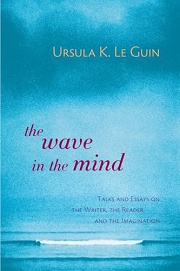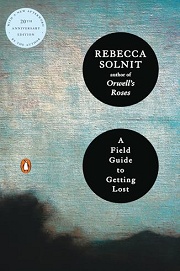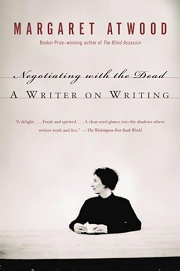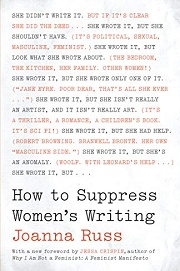Share your thoughts in a quick Shelf Talk!
The Wave in the Mind by Ursula K. Le Guin
"With wit, warmth, and razor-sharp insight, The Wave in the Mind gathers Ursula K. Le Guin’s reflections on language, craft, gender, and the unruly power of imagination. These essays feel like a conversation with a brilliant mentor—one who reminds you that words can shape worlds, on the page and beyond."
Have you read this book? Share what you liked (or didn’t), and we’ll use your answers to recommend your next favorite read!
Love The Wave in the Mind but not sure what to read next?
These picks are popular with readers who enjoyed this book. Complete a quick Shelf Talk to get recommendations made just for you! Warning: possible spoilers for The Wave in the Mind below.
In The Wave in the Mind, did you enjoy ...
... meditative, idea-rich essays that wander through imagination, place, and perception?
A Field Guide to Getting Lost by Rebecca Solnit
If you loved how The Wave in the Mind lingers over language, attention, and the inner weather of thinking—those reflective passages where Le Guin considers how imagination shapes the real—you’ll sink right into Solnit’s luminous essays. She, too, moves from the intimate to the vast, tracing how getting lost (geographically, artistically, emotionally) refines one’s way of seeing. It scratches the same contemplative itch with graceful, rangy thought.
... probing lectures on why writers write and the ethics of storytelling?
Negotiating with the Dead by Margaret Atwood
Le Guin’s candid craft reflections—her talky, generous scrutiny of voice, audience, and responsibility—find a perfect echo in Atwood’s Cambridge lectures. If the sections in The Wave in the Mind about what writing asks of you and what you owe your readers stuck with you, you’ll relish Atwood’s sharp, funny, and deeply practical meditations on the writer’s double self, the marketplace, and the moral stakes of making art.
... witty, razor-edged feminist critique of literary gatekeeping and authority?
How to Suppress Women's Writing by Joanna Russ
If you appreciated the sly humor and steel in The Wave in the Mind when Le Guin dissects gendered assumptions about language and art, Russ’s classic will feel like the spirited, no-nonsense companion you’ve been waiting for. With mordant wit and exacting examples, she names the tactics that diminish women’s work—and in doing so, offers the same bracing clarity and laughter-in-the-throat defiance you admired in Le Guin.
... fragmentary, luminous meditations that braid criticism, memory, and philosophy?
Bluets by Maggie Nelson
The pleasure you found in The Wave in the Mind’s shapeshifting forms—lectures, notes, personal reflections—maps beautifully onto Nelson’s numbered fragments. If you liked how Le Guin lets idea and feeling co-exist on the page, you’ll be moved by how Bluets assembles thinking and living into a prismatic whole: a sequence of bright shards that become, cumulatively, a deep essay on attention, loss, and beauty.
... a candid exploration of self through the discipline and delight of learning a new language?
In Other Words by Jhumpa Lahiri
Le Guin’s reflections on how language shapes identity—and her insistence on clarity and cadence—pair wonderfully with Lahiri’s intimate chronicle of remaking herself in Italian. If you were drawn to The Wave in the Mind for its searching honesty about voice, belonging, and the body in words, Lahiri’s spare, elegant pages will speak to you: a writer re-learning how to think and feel on the page, sentence by sentence.
Unlock your personalized book recommendations! Just take a quick Shelf Talk for The Wave in the Mind by Ursula K. Le Guin. It’s only a few questions and takes less than a minute.





